Synonyms Teaching Resources
Explore synonyms in your English Language Arts classroom with printable synonyms worksheets, board games, and more to help elementary students build their vocabulary.
These teacher-created resources help students define what a synonym is, find synonym examples, explore the difference between a synonym and an antonym, and learn new descriptive words to improve their writing. Download printable and digital resources for your reading centers and writing centers or to use in whole class or individual activities.
Has it been a while since you were teaching this part of the ELA curriculum? Our teacher team knows what it’s like to suddenly teach a brand-new grade level after years away, so we’ve put together a quick refresher on synonyms! Read on for a guide on what a synonym is, how we use them, and even how to pronounce this tricky word!
Synonym Definition
Let's get started with a kid-friendly definition: Synonyms are words that have the same or similar meanings. This makes them the opposite of antonyms (an antonym to antonyms, if you will!).
What Is a Synonym?
Let's face it: Your students are going to need more than just a definition to really understand what a synonym is.
These words are used in writing to avoid repeating the same word over and over again, making writing less repetitive and more interesting for the reader. Synonyms can also help us find more colorful ways of expressing things as they allow the writer to use a word that's more to the point.
For example, instead of using the word "happy" multiple times in a story, you could use synonyms like "joyful," "gleeful," or "ecstatic" to add variety and depth to your writing. Not only does this make the text more fun to read, but it also lets the reader know the level of a character's happiness.

How to Teach Synonyms And Why It's Important
Learning what a synonym is can help unlock a new level of descriptive writing for young students as they begin to experiment with word choice and explore shades of meaning.
For example, when students know that synonyms for cold include freezing and chilled, writing a story about their winter break goes from featuring repetitive sentences about being "cold" to a story filled with varied descriptions!
Learning synonyms is also an important feature of social and emotional learning as students learn various words to better express their feelings. Going beyond "sad or mad" to having more descriptive synonyms for their feelings has been shown to help students feel more in control of their emotions.
Types of Synonyms
As students are flexing their writing muscles and adding different and more descriptive words to their paragraphs and essays, they're going to encounter at least three different synonym types:
Absolute synonyms
Do you have students who tend to think in absolute terms with no room for grey areas? These synonyms will fit them well.
These are words that have the exact same meaning as each other, and they can be used interchangeably in any context. Examples include:
- "happy" and "joyful"
- "big" and "large"
- "small" and "tiny"
Near-synonyms
These words aren't quite the same in meaning, so they're not true synonyms. Still, they come in handy for writers as they learn to seek different words to express what they mean in writing. These words have similar meanings but may differ slightly in terms of intensity, connotation, or usage.
Examples of near-synonyms include:
- "pretty" and "beautiful"
- "angry" and "furious"
- "smart" and "intelligent"
Collocative synonyms
These words can be used interchangeably as synonyms but only in certain contexts or with certain words. Some examples of this are:
- "drink" and "beverage"
- "speak" and "talk"
- "run" and "sprint"
Ideas for Teaching Synonyms
Teaching synonyms this school year? The teachers who create the resources on the Teach Starter team have put together some favorite (and preferred!) tips for adding this component of the ELA standards to your lesson planning.
- Create a classroom word bank on your whiteboard or bulletin board to collect synonyms for common words as a whole class. Allow students to add suggestions throughout the school year.
- Introduce students to the thesaurus to learn where and how to look for fresh synonyms when writing.
- Provide students with a list of "ghost" words, and encourage them to use their new thesaurus skills to find replacements. This is a fun Halloween activity for your centers!
- Play word match synonym games.
- Provide students with copies of the local or school newspaper, and challenge them to circle as many synonyms as they can find for a list of common words you've listed on your whiteboard such as said, cold, and important.
- Divide students into small groups or pairs, and challenge your students to come up with a list of as many synonyms as they can think of for a word you have said. You can also use this activity to help students practice using antonyms!
- Free Plan
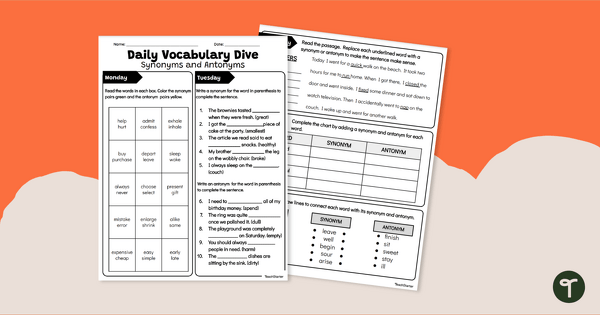
Daily Vocabulary Dive - Synonyms and Antonyms Worksheet
Give your students a daily dose of synonym and antonym review with a 5-day vocabulary warm-up worksheet.
- Plus Plan
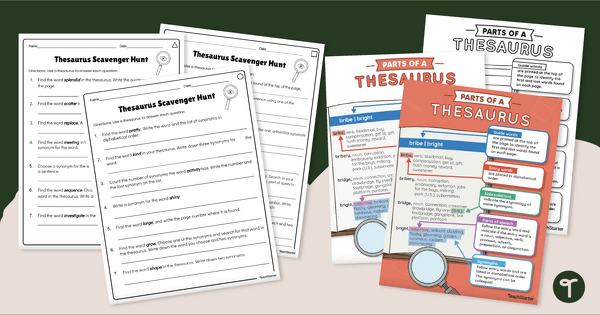
Using a Thesaurus - Worksheets and Anchor Charts
Practice using a thesaurus with a printable thesaurus anchor chart and differentiated practice worksheets.
- Free Plan
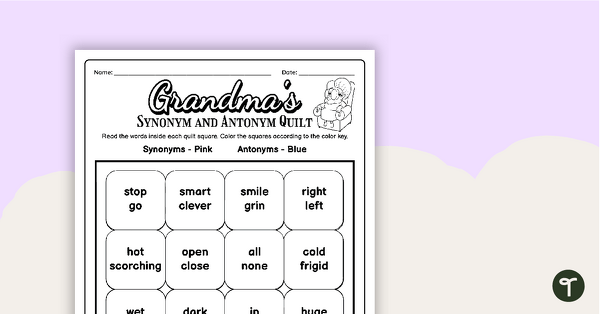
Synonyms and Antonyms Worksheet - Color By Code
Help Gran choose her next quilt design with a Synonyms and Antonyms Color-by-Code Worksheet.
- Free Plan
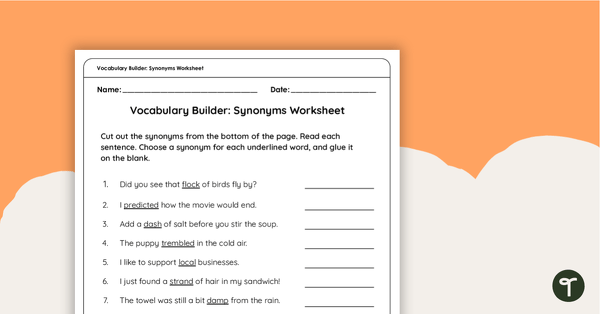
Vocabulary Builder: Synonym Worksheet
Practice synonym matching with this cut and paste worksheet.
- Free Plan
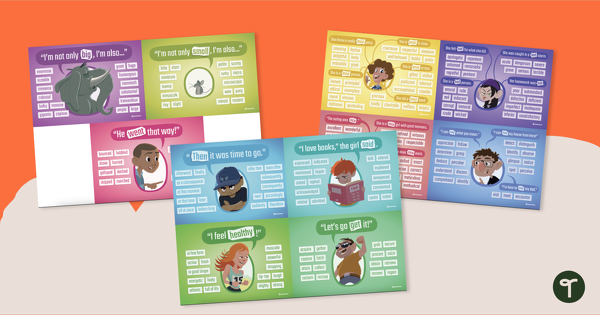
Synonyms- Printable Flashcards
Build vocabulary skills with individual Synonym anchor chart flash cards.
- Plus Plan
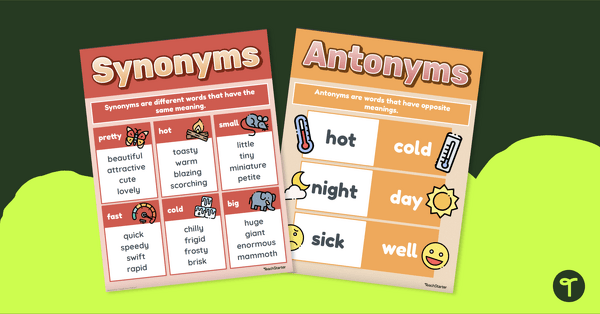
Synonym and Antonym Posters
Print a pair of handy synonym and antonym anchor charts for your students to reference during writing lessons.
- Plus Plan
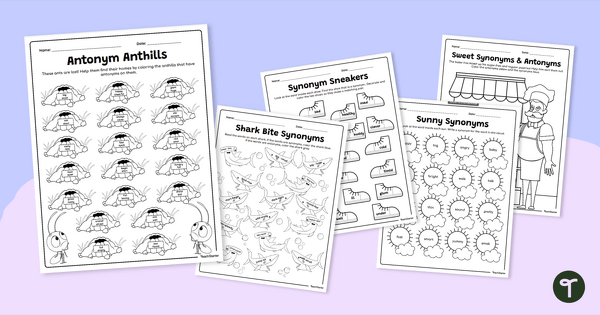
Synonyms and Antonyms - Worksheet Pack
Practice identifying and using synonyms and antonyms with five fun synonym and antonym worksheets.
- Free Plan
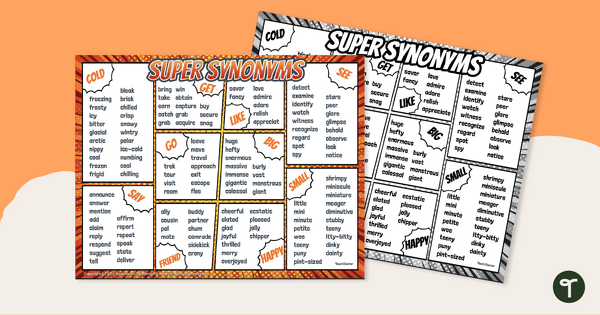
Super Synonyms List
Boost your students’ vocabularies with a synonyms list to reference in their daily writing lessons.
- Plus Plan
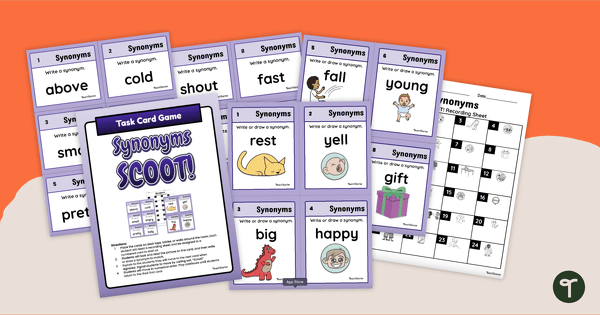
Ready, Set, SCOOT! Synonym Vocabulary Game
Build vocabulary and recognition of synonyms with a fun game of Synonyms Scoot!
- Plus Plan
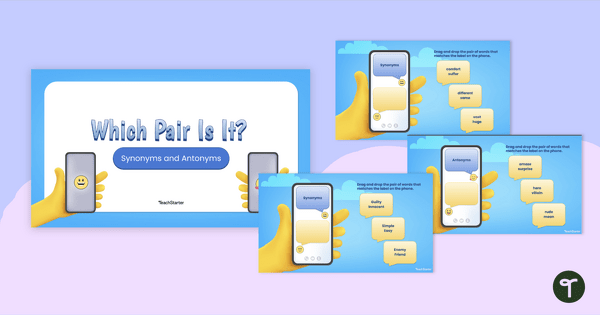
Which Pair Is It? Interactive Synonyms and Antonyms Activity
Help your students learn new synonyms and antonyms with an interactive matching activity.
- Plus Plan
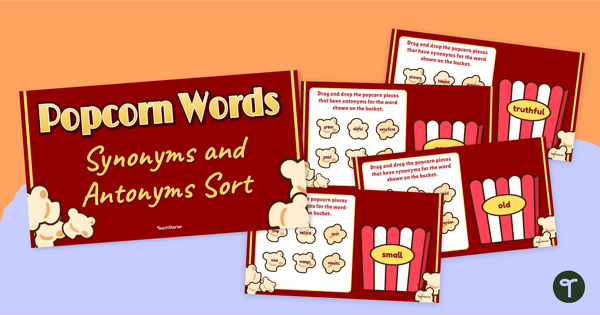
Popcorn Synonyms and Antonyms - Interactive Sort
Make your students’ vocabulary skills “POP” with an interactive, drag-and-drop synonym and antonym activity.
- Plus Plan
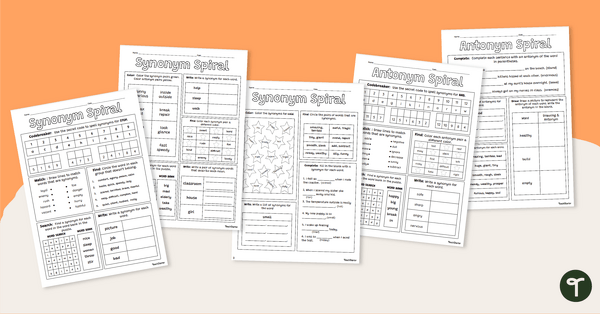
Synonyms and Antonyms Practice - Worksheets
Boost vocabulary skills with daily review worksheets on synonyms and antonyms.
- Plus Plan
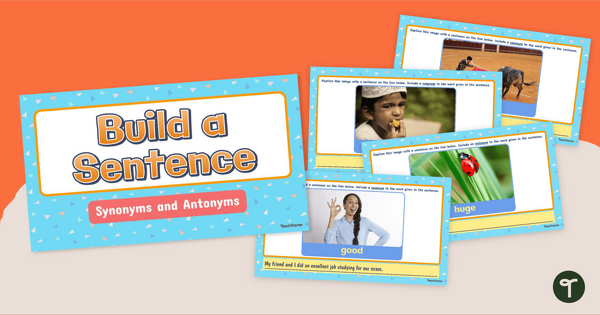
Synonyms and Antonyms - Build a Sentence Interactive
Build strong vocabulary and sentence-writing skills with an interactive synonyms and antonyms sentence-building activity.
- Plus Plan
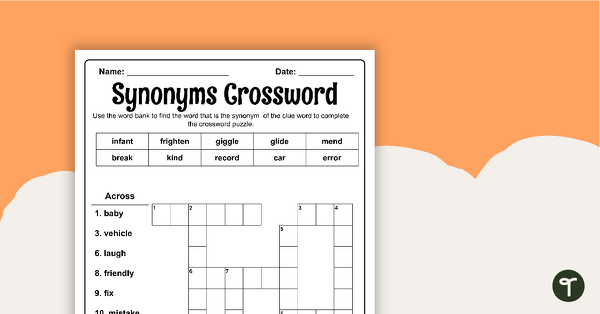
Synonyms - Vocabulary Crossword Puzzle
Boost vocabulary skills with a fun synonym crossword puzzle.
- Plus Plan
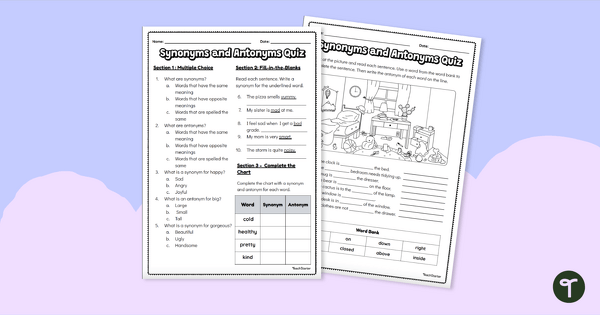
Synonyms and Antonyms Quiz
Assess your students’ knowledge of synonyms and antonyms with a vocabulary quiz.
- Plus Plan
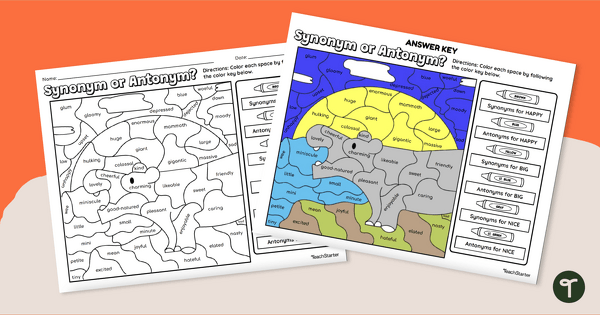
Color By Code Worksheet - Synonyms and Antonyms
Reveal the hidden picture and practice using synonyms and antonyms with a vocabulary color-by-code worksheet.
- Plus Plan
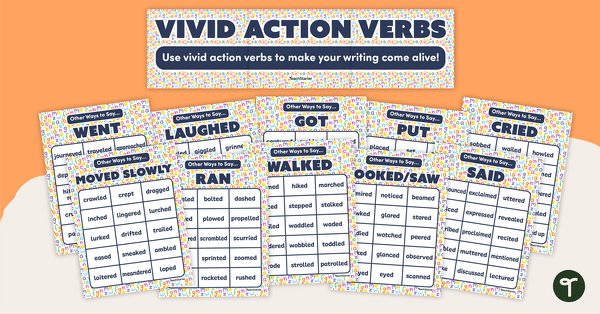
Vivid Action Verbs Posters - Using Strong Verbs
Teach your students to omit boring, overused verbs from their writing with a classroom set of Vivid Verb Posters.
- Plus Plan
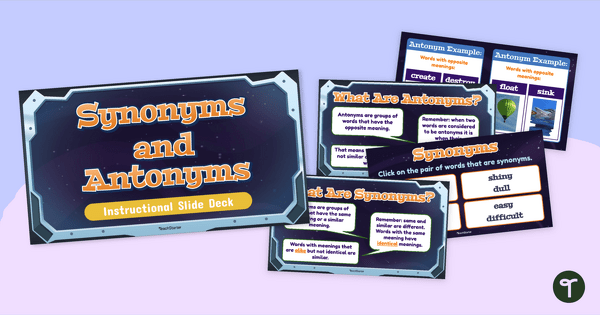
Synonym and Antonym Instructional Slides
Build skills in identifying synonyms and antonyms with an interactive instructional slide deck.
- Plus Plan
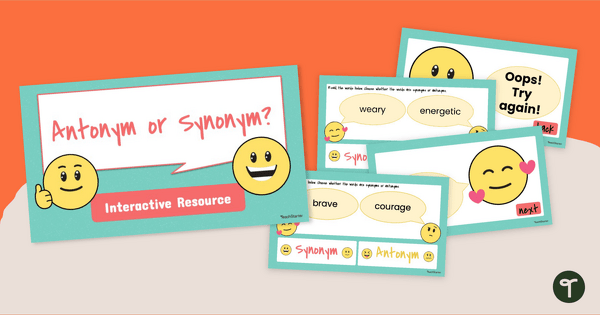
Antonym or Synonym? Interactive Resource
Boost vocabulary skills using a fun emoji-themed self-checking activity with synonyms and antonyms!
- Free Plan
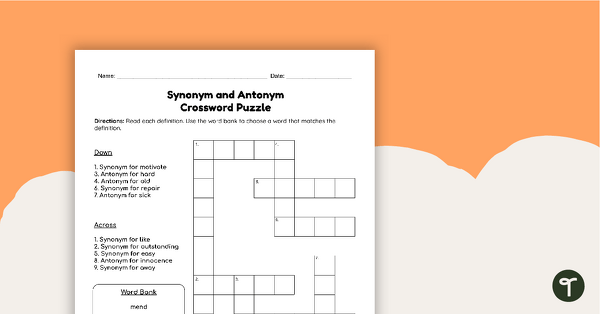
Synonym and Antonym Crossword Puzzle
Review vocabulary skills and boost your students’ knowledge of synonyms and antonyms with a crossword puzzle worksheet.
- Plus Plan
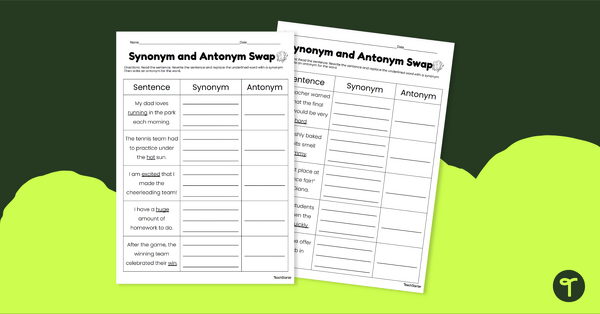
Synonym and Antonym Swap Worksheet
Build vocabulary skills with a printable synonyms and antonyms worksheet.
- Plus Plan
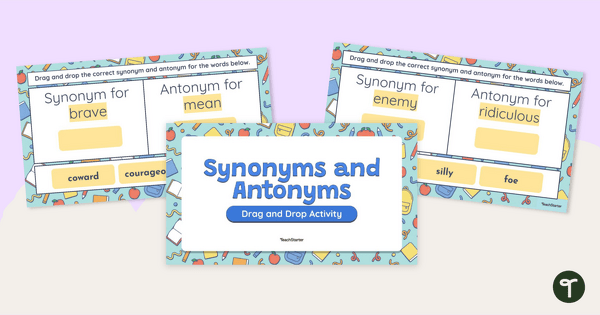
Synonyms and Antonyms - Digital Sorting Activity
Identify synonyms and antonyms with an interactive, drag-and-drop sorting activity.
- Plus Plan
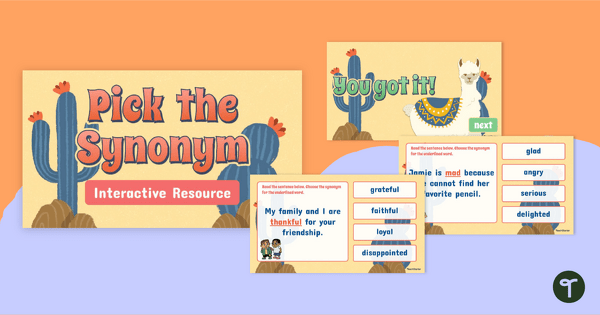
Pick the Synonym - Self-Checking Interactive Activity
Build some ‘llama-zing’ vocabulary skills using a fun llama-themed self-checking activity with synonyms!
- Plus Plan
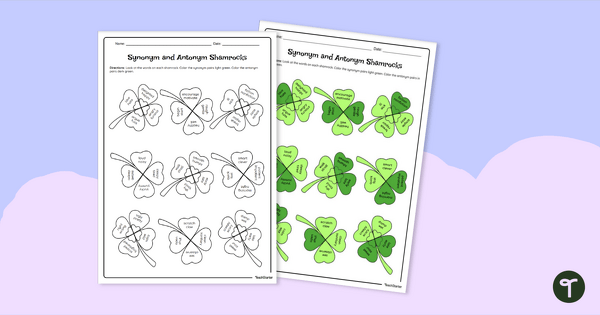
Shamrock Synonyms and Antonyms Worksheet
Build vocabulary with a Shamrock Synonyms and Antonyms worksheet.
- Plus Plan
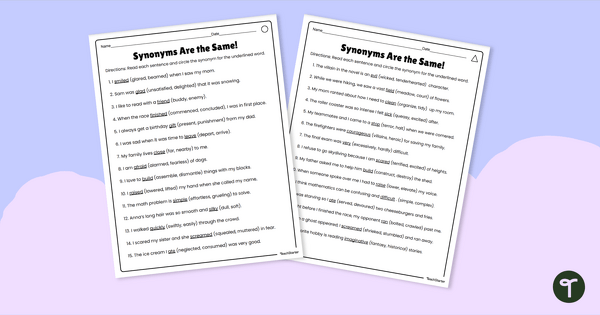
Synonyms Are the Same! - Vocabulary Worksheets
Practice identifying and using synonyms in sentences with a synonyms worksheet.
- Plus Plan
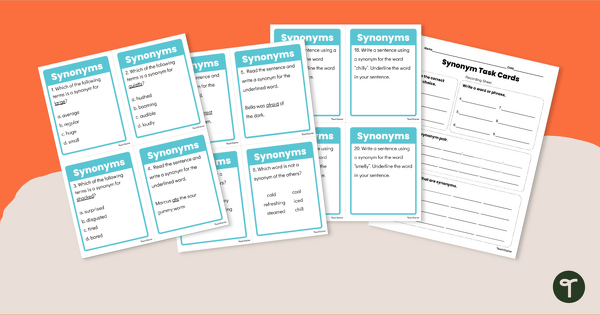
Synonym Task Cards
Build vocabulary and recognition of synonyms with a set of Synonym task cards.
- Plus Plan
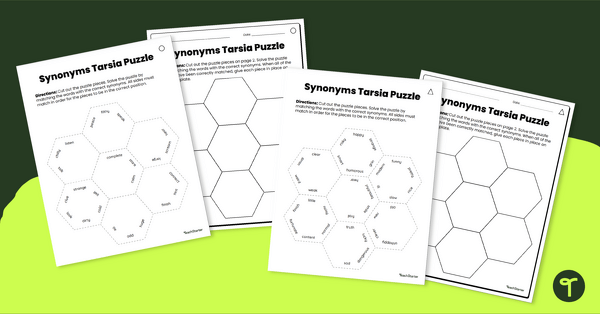
Synonyms Tarsia Puzzle
Have fun building vocabulary skills with a printable synonyms tarsia puzzle activity.
- Plus Plan
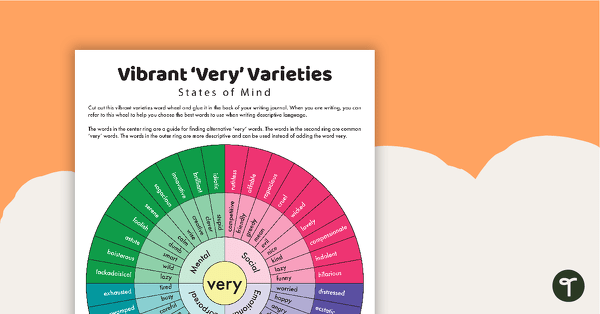
Another Word for Very – Synonyms Word Wheel
Replace the word "very" in your students' writings by giving them a "wheely" good synonyms reference guide.
- Plus Plan
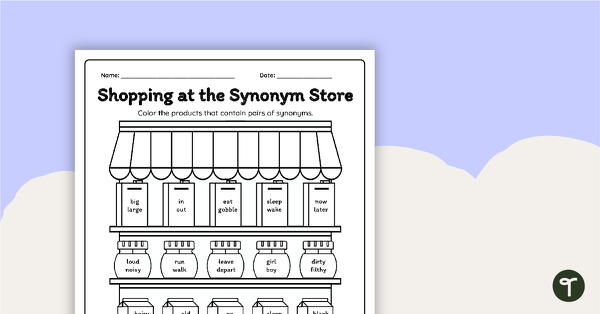
Shopping for Synonyms - Worksheet
Go shopping for synonyms with a fun “Synonym Shop” color by code worksheet.
- Plus Plan
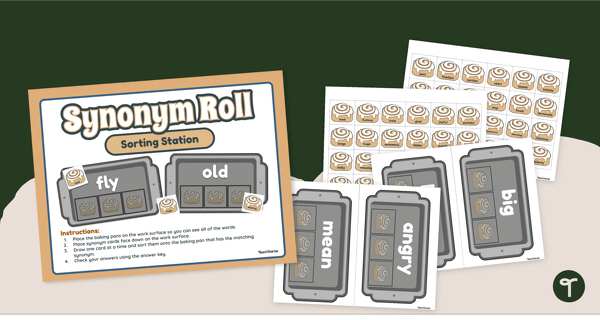
Synonym Roll Sorting Center
Encourage your kids to take a bite out of language learning with our sweet “Synonym Roll” sorting activity.
- Plus Plan
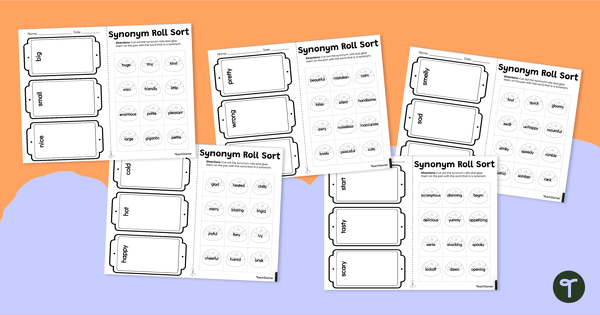
Sort the Synonym Rolls Worksheets
Encourage your kids to take a bite out of language learning with our sweet “Synonym Roll” sorting worksheets.
- Plus Plan
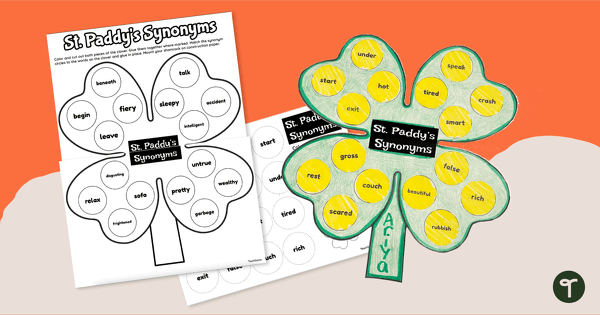
St. Paddy's Synonyms - St. Patrick's Day Craft
Practice identifying and matching synonyms with a fun St. Patrick’s Day Craft Activity.
